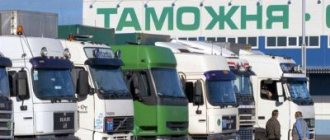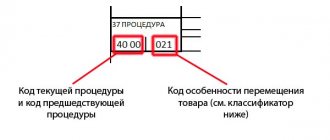Home Customs regimes
Customs regime is the status that a product or vehicle acquires when moving across the customs border. Depending on the type of regime, different customs duties are applied to transported goods. Duties are a mandatory payment. In case of non-payment or incomplete payment of duties, the cargo may be detained at customs. How to correctly calculate the amount of customs duty? There is only one answer - to study the customs legislation of the country in which the cargo will be cleared, as well as the conditions and requirements set out in the selected TR.
The choice of one or another customs regime is made by the declarant. It is he who bears legal responsibility in case of non-compliance with its terms and requirements. In this case, the declarant has the right to change the selected procedure to another (Article 203 of the Labor Code of the Customs Union). Control over compliance with the terms of the procedures is entrusted to the customs authorities (Article 206 of the Labor Code of the Customs Union).
The customs regime (the text also uses the term “customs procedure”, or the abbreviation “TR”) is one of the most important concepts that form the essence of the foreign economic activity of the state.
Modern structure of customs authorities
Prototypes of customs appeared in the 10th century.
The first duties were levied for movement across the territory and for the entry of merchants with their goods. The collection was carried out by mytniks (analogous to modern customs officers), who served at the outposts. A little later, after the introduction of the “tamga” duty by the Mongol-Tatars, outposts began to bear the name of customs, and duty collectors began to be called customs officers. The modern customs structure consists of the Central Office, which is divided into the Main Directorate and the Directorate. The regional customs department and the customs office of direct destination are subordinate to customs. The customs themselves are divided into territorial regional departments, which coincide with the federal districts:
- Central Customs,
- Far Eastern, customs,
- North Caucasus Customs,
- Volga customs,
- Ural customs,
- Southern Department,
- Siberian Department,
- North-West Customs.
Are you an expert in this subject area?
We offer to become the author of the Directory. Working conditions These departments are subordinate to the customs office, which includes posts. Customs offices are divided into:
- aviation (Vnukovo, Domodedovo, Sheremetyevo),
- specialized (Central Excise Customs, Central Energy Customs),
- territorial (Kaliningrad, Crimea, Moscow regional customs, Sevastopol),
- providing (Central Base Customs, Canine Center of the Federal Customs Service of Russia).
Types of customs posts
The most common type of customs is the customs post.
The definition of a customs post is prescribed in the Order of the Federal Customs Service No. 1701 dated September 4, 2014. “On approval of the General Regulations on the customs post.”
Definition 1
A customs post is a customs authority that is part of the centralized system of the Federal Customs Service (FCS) of the Russian Federation and ensures the implementation of the tasks and functions of the FCS of the Russian Federation in the region where the customs post operates.
In addition, its legal status is spelled out in the Constitution of the Russian Federation, the Customs Code (TC), Federal Law No. 311 “On customs regulation in the Russian Federation.”
Finished works on a similar topic
Course work Types of customs and customs unions 480 ₽ Abstract Types of customs and customs unions 220 ₽ Test work Types of customs and customs unions 220 ₽
Receive completed work or specialist advice on your educational project Find out the cost
The customs post covers its region of activity, which may include:
- municipality,
- transport infrastructure facilities - river or sea ports, airports, railway stations, etc.,
- large enterprise. Customs posts may be located on the territory of large plants.
Customs posts are subordinate to customs or regional customs and are the lowest link in the customs system. Despite this, it is at customs posts that most of the declaration operations for imported or exported goods take place. Today in Russia there are 537 units, of which 93 are under the jurisdiction of customs.
All customs posts are divided into 2 types:
- border post. This post is located at checkpoints across the customs border. Border posts are: automobile, air, sea, mixed, river, lake, pedestrian,
- internal post,
According to the criterion of the nationality of persons crossing the border and the nationality of the property and vehicles they move, all checkpoints can be divided into multilateral, bilateral and local.
Depending on what type of transport crosses the customs post, they are divided into road, rail, air and sea.
According to the type of authority, a customs post can be with or without the formation of a legal entity (LE). Customs posts that have the status of legal entities are formed by decision of the Federal Customs Service of Russia and have broader powers with their own financial account. At the same time, a chief accountant must be present in the staff unit
In addition to this, there are specialized posts that are intended for:
- import of specialized goods: biological, chemical and radioactive waste.
- passage of animals and plants,
- design of metal and stone products,
- import and export of excisable goods that are subject to excise taxes,
- customs clearance of energy resources
Eurasian Economic Commission
Article 1. Customs regulation in the Customs Union
1. Customs regulation in the Customs Union within the framework of the Eurasian Economic Community (hereinafter referred to as the Customs Union) - legal regulation of relations related to the movement of goods across the customs border of the Customs Union, their transportation through the single customs territory of the Customs Union under customs control, temporary storage, customs declaration , release and use in accordance with customs procedures, customs control, payment of customs duties, as well as power relations between customs authorities and persons exercising the rights of ownership, use and disposal of these goods.
2. Customs regulation in the Customs Union is carried out in accordance with the customs legislation of the Customs Union, and in the part not regulated by such legislation, until the establishment of appropriate legal relations at the level of the customs legislation of the Customs Union, in accordance with the legislation of the member states of the Customs Union.
(clause 2 as amended by the Protocol dated April 16, 2010)
Article 2. Single customs territory of the Customs Union and customs border
(as amended by the Protocol dated April 16, 2010)
1. The single customs territory of the Customs Union (hereinafter referred to as the customs territory of the Customs Union) consists of the territories of the Republic of Belarus, the Republic of Kazakhstan and the Russian Federation, as well as artificial islands, installations, structures and other objects located outside the territories of the member states of the Customs Union, in relation to which Member states of the Customs Union have exclusive jurisdiction.
2. The limits of the customs territory of the Customs Union are the customs border of the Customs Union (hereinafter referred to as the customs border).
3. In accordance with international treaties of the member states of the Customs Union, the customs border may be the limits of individual territories located on the territories of the member states of the Customs Union.
Article 3. Customs legislation of the Customs Union
1. The customs legislation of the Customs Union consists of:
1) this Code;
2) international treaties of the member states of the Customs Union regulating customs legal relations in the Customs Union;
3) decisions of the Commission of the Customs Union regulating customs legal relations in the Customs Union, adopted in accordance with this Code and international treaties of the member states of the Customs Union.
2. The customs legislation of the Customs Union is valid in the customs territory of the Customs Union.
If, in accordance with the customs legislation of the Customs Union, customs regulation in the Customs Union is carried out in accordance with the legislation of a member state of the Customs Union, such legislation is valid on the territory of this member state of the Customs Union.
(paragraph introduced by the Protocol dated April 16, 2010)
3. In customs regulation, measures of customs tariff regulation, prohibitions and restrictions, legislative acts of the member states of the Customs Union in the field of taxation, valid on the day of registration of the customs declaration or other customs documents, are applied, unless otherwise established by this Code and (or) in accordance with with international treaties of the member states of the Customs Union.
(clause 3 as amended by the Protocol dated April 16, 2010)
4. When moving goods across the customs border in violation of the requirements established by the customs legislation of the Customs Union, the customs legislation of the Customs Union, customs tariff regulation measures, prohibitions and restrictions, legislative acts of the member states of the Customs Union in the field of taxation, valid on the day of the actual crossing, are applied goods at the customs border, unless otherwise established by this Code and (or) in accordance with international treaties of the member states of the Customs Union.
If the day of actual crossing of the customs border by goods is not established, the customs legislation of the Customs Union, customs tariff regulation measures, prohibitions and restrictions, legislative acts of the member states of the Customs Union in the field of taxation, valid on the day of detection of a violation of established requirements, are applied, unless otherwise established herein. Code and (or) in accordance with international treaties of the member states of the Customs Union.
(clause 4 was introduced by the Protocol dated April 16, 2010)
Article 4. Basic terms used in this Code
1. This Code uses the following basic terms and their definitions:
1) accident - an incident of a technical, technological or other nature, harmful in its consequences, that occurred with vehicles and (or) other goods under customs control, resulting in their quantitative and (or) qualitative changes not provided for by the customs legislation of the Customs Union, which are not caused by deliberate actions of the owner and (or) person in whose possession the goods were at the time of such changes, with the exception of natural changes under normal conditions of transportation, storage and use (operation), as well as extraordinary and unpreventable circumstances under these conditions (force majeure );
2) administrative offenses and crimes - administrative offenses for which, in accordance with the legislation of the member states of the Customs Union, customs authorities conduct the administrative process (carry out proceedings), and crimes for which the proceedings are assigned to the jurisdiction of customs authorities in accordance with the legislation of the member states of the Customs Union union;
3) importation of goods into the customs territory of the Customs Union - the commission of actions related to crossing the customs border, as a result of which goods arrived in the customs territory of the Customs Union by any means, including sending in international mail, using pipeline transport and power lines, before their release by customs authorities organs;
4) export of goods from the customs territory of the Customs Union - taking actions aimed at exporting goods from the customs territory of the Customs Union by any means, including sending by international mail, using pipeline transport and power lines, before actually crossing the customs border;
5) release of goods - an action of customs authorities allowing interested parties to use goods in accordance with the terms of the declared customs procedure or in accordance with the conditions established for certain categories of goods that are not subject to placement under customs procedures in accordance with this Code;
(clause 5 as amended by the Protocol dated April 16, 2010)
6) declarant – a person who declares goods or on whose behalf goods are declared;
7) interested parties - persons whose interests in relation to goods are affected by decisions, actions (inaction) of customs authorities directly and individually;
 prohibitions and restrictions - a set of measures applied to goods moved across the customs border, including non-tariff regulation measures, measures affecting foreign trade in goods and introduced based on national interests, special types of bans and restrictions on foreign trade in goods, export control measures, including including in relation to military products, technical regulation, as well as sanitary-epidemiological, veterinary, quarantine, phytosanitary and radiation requirements, which are established by international treaties of the member states of the Customs Union, decisions of the Customs Union Commission and regulatory legal acts of the member states of the Customs Union, issued in accordance with international treaties of the member states of the Customs Union;
prohibitions and restrictions - a set of measures applied to goods moved across the customs border, including non-tariff regulation measures, measures affecting foreign trade in goods and introduced based on national interests, special types of bans and restrictions on foreign trade in goods, export control measures, including including in relation to military products, technical regulation, as well as sanitary-epidemiological, veterinary, quarantine, phytosanitary and radiation requirements, which are established by international treaties of the member states of the Customs Union, decisions of the Customs Union Commission and regulatory legal acts of the member states of the Customs Union, issued in accordance with international treaties of the member states of the Customs Union;
9) foreign person - a person who is not a person of a member state of the Customs Union;
10) foreign goods - goods that are not goods of the Customs Union, as well as goods that have acquired the status of foreign goods in accordance with this Code;
11) The Customs Union Commission is a single permanent regulatory body of the Customs Union;
12) commercial documents - invoice (invoice), specifications, shipping and packing lists and other documents used in the implementation of foreign trade and other activities, as well as to confirm transactions related to the movement of goods across the customs border of the Customs Union;
13) person - an individual and (or) legal entity, as well as an organization that is not a legal entity, unless otherwise follows from this Code;
14) a person of a member state of the Customs Union - a legal entity, an organization that is not a legal entity, created in accordance with the legislation of a member state of the Customs Union, as well as an individual who has permanent residence in a member state of the Customs Union, including an individual an entrepreneur registered in accordance with the legislation of a member state of the Customs Union;
15) international treaties of the member states of the Customs Union - international treaties that constitute the legal framework of the Customs Union;
16) international postal items - postal items accepted for shipment outside the customs territory of the Customs Union, entering the customs territory of the Customs Union or transiting through this territory and accompanied by documents provided for by the acts of the Universal Postal Union;
17) non-tariff regulation measures - a set of measures to regulate foreign trade in goods, carried out by introducing quantitative and other prohibitions and restrictions of an economic nature, which are established by international treaties of the member states of the Customs Union, decisions of the Customs Union Commission and regulatory legal acts of the member states of the Customs Union, issued in accordance with international treaties of the member states of the Customs Union;
18) taxes - value added tax and excise tax (excise taxes) levied by customs authorities when importing goods into the customs territory of the Customs Union;
19) illegal movement of goods across the customs border - movement of goods across the customs border outside established places or at unspecified working hours of customs authorities in these places, or with concealment from customs control, or with false declaration or non-declaration of goods, or with the use of documents containing false information about goods, and (or) using counterfeit means of identification or those related to other goods, as well as an attempt at such movement;
20) postal operator - an entity of a member state of the Customs Union, providing the provision of postal services in accordance with the legislation of the member states of the Customs Union and the acts of the Universal Postal Union;
21) carrier - a person transporting goods and (or) passengers across the customs border and (or) transporting goods under customs control within the customs territory of the Customs Union, or who is responsible for the use of vehicles;
22) movement of goods across the customs border - import of goods into the customs territory of the Customs Union or export of goods from the customs territory of the Customs Union;
23) supplies – goods:
necessary to ensure the normal operation and maintenance of sea (river) vessels, inland navigation vessels, river-sea navigation vessels, hydrofoils, hovercraft and small vessels, including self-propelled and non-self-propelled lighters and barges (hereinafter - water ships), aircraft and trains en route or at intermediate stops or parking points, with the exception of spare parts and equipment;
(paragraph as amended by the Protocol dated April 16, 2010)
intended for consumption by passengers and crew members on board watercraft, aircraft or by passengers and train crew members on board trains, whether such supplies are sold or not;
intended for sale to passengers and crew members of water vessels and aircraft without the purpose of consuming said supplies on board these vessels;
24) customs declaration - a document drawn up in the prescribed form, containing information about the goods, about the chosen customs procedure and other information necessary for the release of goods;
25) customs duty – a mandatory payment collected by customs authorities in connection with the movement of goods across the customs border;
26) customs procedure - a set of rules that define, for customs purposes, the requirements and conditions for the use and (or) disposal of goods in the customs territory of the Customs Union or beyond its borders;
27) customs declaration - a statement by the declarant to the customs authority of information about the goods, about the chosen customs procedure and (or) other information necessary for the release of goods;
(paragraph 27 as amended by the Protocol dated April 16, 2010)
28) customs documents – documents compiled exclusively for customs purposes;
29) customs operations - actions performed by persons and customs authorities in order to ensure compliance with the customs legislation of the Customs Union;
30) customs authorities - customs authorities of the member states of the Customs Union;
31) customs control - a set of measures carried out by customs authorities, including using a risk management system, in order to ensure compliance with the customs legislation of the Customs Union and the legislation of the member states of the Customs Union;
(clause 31 as amended by the Protocol dated April 16, 2010)
32) customs authority of destination - a customs authority in the region of whose activity there is a place of delivery of goods established by the customs authority of departure or which completes the customs procedure of customs transit;
33) customs authority of departure - a customs authority that carries out customs operations related to the placement of goods under the customs procedure of customs transit;
34) customs representative - a legal entity of a member state of the Customs Union, performing customs operations on behalf and on behalf of the declarant or other interested party in accordance with the customs legislation of the Customs Union;
(paragraph 34 as amended by the Protocol dated April 16, 2010)
35) goods - any movable property moved across the customs border, including storage media, the currency of the member states of the Customs Union, securities and (or) currency values, traveler's checks, electrical and other types of energy, as well as other things being moved, equivalent to real estate;
36) goods for personal use - goods intended for personal, family, household and other, not related to business, needs of individuals, transported across the customs border in accompanied or unaccompanied baggage, international mail or otherwise;
37) goods of the Customs Union - goods located in the customs territory of the Customs Union:
entirely produced in the territories of member states of the Customs Union;
imported into the customs territory of the Customs Union and acquired the status of goods of the Customs Union in accordance with this Code and (or) international treaties of the member states of the Customs Union;
manufactured in the territories of the member states of the Customs Union from the goods specified in paragraphs two and three of this subparagraph, and (or) foreign goods, and acquired the status of goods of the Customs Union in accordance with this Code and (or) international treaties of the member states of the Customs Union;
38) transport (transportation) documents - a bill of lading, invoice or other document confirming the existence of a contract for the carriage of goods and accompanying them during such transportation;
39) vehicles - a category of goods that includes any watercraft, aircraft, motor vehicle, trailer, semi-trailer, railway vehicle (railway rolling stock, unit of railway rolling stock) or container with technical passports or technical forms for spare parts provided for them , accessories and equipment, fuels and lubricants, cooling and other technical liquids contained in refueling containers provided for by their design, if they are transported along with the specified vehicles;
(paragraph 39 as amended by the Protocol dated April 16, 2010)
40) vehicles for international transportation - vehicles imported into the customs territory of the Customs Union or exported beyond its borders in order to begin and (or) complete the international transportation of goods, passengers and (or) luggage, with special equipment located on them intended for loading , unloading, handling and protection of cargo, supplies and equipment, as well as spare parts and equipment intended for repair, maintenance or operation of the vehicle en route.
41) express cargo - goods transported as part of high-speed transportation by any means of transport using an electronic information system for organizing and tracking transportation in order to deliver this product to the recipient in accordance with an individual invoice within the minimum possible and (or) fixed period of time, for with the exception of goods sent by international mail.
(clause 41 introduced by the Protocol of April 16, 2010)
2. Other terms of the customs legislation of the Customs Union are used in the meanings defined in the relevant articles of this Code and international treaties of the member states of the Customs Union.
3. The terms of civil and other branches of legislation used in this Code are used in each of the member states of the Customs Union in the meaning in which they are used in the relevant branches of legislation of these member states of the Customs Union, unless otherwise provided by this Code.
(clause 3 as amended by the Protocol dated April 16, 2010)
Article 5. The procedure for calculating the deadlines established by the customs legislation of the Customs Union
1. The period established by the customs legislation of the Customs Union is determined by a calendar date or the expiration of a period of time, which is calculated in years, months, days or hours.
A deadline can also be determined by indicating an event that must occur or an action that must be performed.
2. If the customs legislation of the Customs Union does not establish a special procedure for calculating deadlines, to determine the beginning and end of the deadlines determined by the period of time, the customs legislation of the Customs Union applies the rules provided for in paragraphs 3 - 8 of this article.
3. The course of a period defined by a period of time begins the next day after the calendar date or the occurrence of an event that determines its beginning.
4. A term calculated in years expires in the corresponding month and day of the last year of the term.
5. The term, calculated in months, expires on the corresponding date of the last month of the term.
If the end of a period calculated in months falls on a month in which there is no corresponding date, then the period expires on the last day of that month.
6. If the last day of the period falls on a non-working day, the end of the period is considered to be the next working day following it.
7. If a deadline is set for performing any action, it can be performed until 24 (twenty-four) hours of the last day of the deadline.
However, if this action must be performed in an organization, then the period expires at the hour when the corresponding operations in this organization, according to established rules, cease.
Written applications and notices submitted to the postal institution (organization) before 24 (twenty-four) hours of the last day of the deadline are considered made on time.
8. If the period is calculated in working days, working days mean the days of the week from Monday to Friday, which do not fall on holidays declared non-working days in accordance with the legislation of the member states of the Customs Union.
If in places where goods are moved across the customs border and other places where customs authorities are located, the working hours of customs authorities on non-working days are established, the period for carrying out customs operations by these customs authorities, calculated in working days, includes non-working days.
(paragraph introduced by the Protocol dated April 16, 2010)
Article 6. Customs authorities and their main tasks
1. Customs authorities provide solutions to the following main tasks in the customs territory of the Customs Union:
1) assistance in the implementation of the common trade policy of the Customs Union;
2) ensuring the implementation of the customs legislation of the Customs Union and other legislation of the member states of the Customs Union, control over the implementation of which is entrusted to the customs authorities;
3) carrying out customs operations and carrying out customs control, including within the framework of providing mutual administrative assistance;
4) collection of customs duties, as well as special, anti-dumping and countervailing duties, monitoring the correctness of their calculation and timely payment, taking measures to enforce them within its competence;
5) ensuring, within its competence, compliance with customs tariff regulation measures and prohibitions and restrictions in relation to goods transported across the customs border;
6) ensuring, within its competence, compliance with the rights and legitimate interests of persons in the field of customs regulation and creating conditions for accelerating trade turnover across the customs border;
7) ensuring, within its competence, measures to protect the national security of the member states of the Customs Union, human life and health, flora and fauna, the environment, as well as, in accordance with the international treaty of the member states of the Customs Union, measures to counter legalization (money laundering) ) proceeds from crime and the financing of terrorism when exercising control over the movement across the customs border of the currencies of member states of the Customs Union, securities and (or) currency values, traveler's checks;
(clause 7 as amended by the Protocol dated April 16, 2010)
 identification, prevention and suppression of administrative offenses and crimes in accordance with the legislation of the member states of the Customs Union;
identification, prevention and suppression of administrative offenses and crimes in accordance with the legislation of the member states of the Customs Union;
9) ensuring the protection of intellectual property rights in the customs territory of the Customs Union within its competence;
10) maintaining customs statistics.
The legislation of the member states of the Customs Union may establish other tasks solved by customs authorities.
2. The system of customs authorities, their rights, duties and responsibilities, as well as the conditions for serving in customs authorities are determined by the legislation of the member states of the Customs Union.
Article 7. Law enforcement activities of customs authorities
1. The customs authorities of the member states of the Customs Union are the bodies of inquiry in cases of smuggling, evasion of customs duties and other crimes, the proceedings for which, in accordance with the legislation of the member states of the Customs Union, are assigned to the jurisdiction of the customs authorities.
2. The customs authorities of the member states of the Customs Union carry out operational investigative activities in order to identify persons preparing, committing or having committed an unlawful act, recognized by the legislation of these states as a crime, the proceedings for which are assigned to the jurisdiction of the customs authorities, fulfilling requests from international customs organizations, customs and other competent authorities of foreign states in accordance with international treaties.
Operational investigative activities are carried out by customs authorities of the member states of the Customs Union in accordance with the legislation of the member states of the Customs Union on operational investigative activities.
3. The customs authorities of the member states of the Customs Union conduct administrative proceedings (carry out proceedings) in cases of administrative offenses and bring persons to administrative responsibility in accordance with the legislation of the member states of the Customs Union.
Article 8. Attitude to information received by customs authorities
1. Any information received by customs authorities in accordance with the customs legislation of the Customs Union and (or) the legislation of the member states of the Customs Union is used by such authorities exclusively for customs purposes, including for the prevention and suppression of administrative offenses and crimes.
2. Customs authorities, their officials, as well as other persons who, in accordance with the legislation of the member states of the Customs Union, have access to the information specified in paragraph 1 of this article, do not have the right to disclose, use for personal purposes or transfer to third parties, including including government bodies, information constituting state, commercial, banking, tax or other secrets protected by law, and other confidential information, except for cases established by this Code and (or) the legislation of the member states of the Customs Union.
The customs authorities of one state - a member of the Customs Union transfer the information provided to them to the state authorities of this state - a member of the Customs Union, if such information is necessary for these authorities to solve the tasks assigned to them by the legislation of this state - a member of the Customs Union, in the manner and in compliance with the requirements of the legislation of this state - a member of the Customs Union for the protection of state, commercial, banking, tax or other legally protected secrets (secrets) and other confidential information, as well as international treaties of the member states of the Customs Union.
(paragraph as amended by the Protocol dated April 16, 2010)
Article 9. Appeal against actions (inaction) of customs authorities and their officials
Any person has the right to appeal decisions of customs authorities, actions (inaction) of customs authorities or their officials in the manner and within the time limits established by the legislation of the member state of the Customs Union, the decisions, actions (inaction) of the customs authority or officials of the customs authority of which are being appealed.







